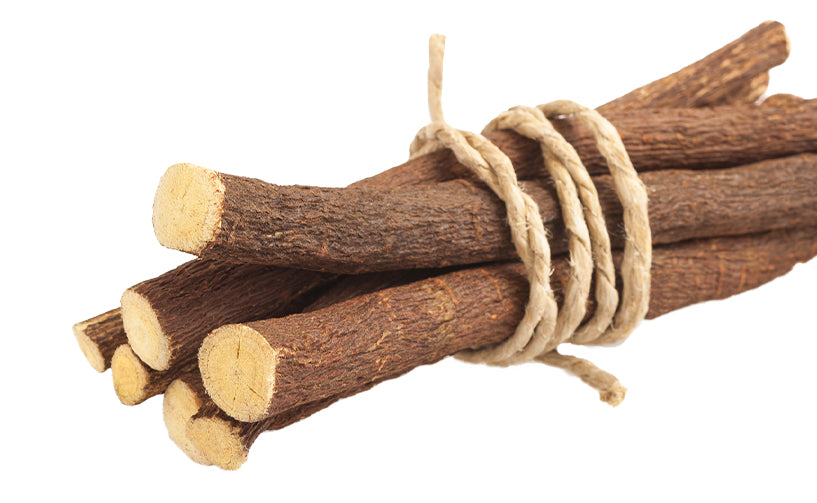Mulethi refers to the herb liquorice which is scientifically known as Glycyrrhiza glabra. The plant is native to the countries of Asia and Europe, including India. It is a perennial herb and is used as a flavouring agent in the Middle East and Europe. The leaves of the plant are pinnate and the flowers are whitish-blue to purple in colour. The fruits contain seeds and are like pods. Mulethi is mostly found in India, Italy, Afghanistan, Iran, Turkey, Azerbaijan and Uzbekistan.
The roots of the plant are of high value because of their richly flavoured and sweet odour. The plant has got its name Glycyrrhiza glabra due to the presence of glycyrrhizin, which is a natural compound responsible for the sweetness. Glycyrrhiza comes from Greek words ‘glykys’ which means ‘sweet’ and ‘rhiza’ which means root and refers to the very sweet-tasting root. In Chinese medicine system, it is known as a “peacemaker”. The herb is currently cultivated and grown in Spain, Germany, Russia, England, Spain and France due to its extensive use in food and aroma industry.
Mulethi has a special type of root system and its roots are called taproots. They are very long and are deep rooted into the ground. Wooden stolon from liquorice plant is gathered and cut into pieces, which gives commercial liquorice. The roots may be unpeeled or peeled that on breaking reveals yellow coloured interior and sweet smell.
Traditionally it was used for rejuvenation, managing jaundice and other ailments in China and Egypt. It was also used as an expectorant.
Liquorice possesses flavanane, glabrene and glabridin, glycyrrhizin, saponins. Liquiritigenin, liquirtin and isoliquertin are fractions of flavonoids for Mulethi including volatile oils such as, linalool, pentanol and hexanol.
Anethole is a main complex compound that provides scent and it is 3% part of the essential oil obtained from liquorice. It is also responsible for providing sweetness to the roots along with glycyrrhizin.
Glycyrrhiza glabra has many health beneficial medicinal properties, such as anti-oxidant, anti-inflammatory, anti-malarial, anti-hyperglycaemic, anti-spasmodic, anti-ulcer, antiviral, anti-bacterial, hepatoprotective and antifungal properties.
Benefits of Mulethi
-
Relieves Stress: It relieves stress and fatigued adrenal gland. Adrenal gland gets exhausted during stress due to continuous production of cortisol and adrenaline. Liquorice regulates the production of these hormones to decrease adrenal gland fatigue.
-
Soothes Digestive System: It soothes the digestive system and speeds the healing process due to its anti-inflammatory action. Glycyrrhizic acid prevents accumulation of toxins in the stomach.
-
Heals Skin Ailments: Liquorice helps with skin disorders, especially eczema.
-
Improves Respiratory Health: It cleanses and soothes the entire respiratory system. It helps in clearing excess mucus accumulation in respiratory tract. It is helpful in conditions like cough, bronchitis and chronic asthma.
-
Improves Menstrual Health in Women: Mulethi provides relief from pre-menstrual syndrome, menopausal symptoms. It relieves cramps during periods and regulates flow of blood during menstrual cycle.
-
Improves Liver Health: It helps in relieving the symptoms of hepatitis.
-
Helps in Chronic Diseases: Liquorice is effectively helpful in diabetes, rheumatoid arthritis, fatigue, neurological illnesses, female fertility, cancer, obesity and maintains cholesterol level within a healthy range.
-
Improves Immunity: It promotes immunity and facilitates detoxification of the body so that one falls less ill.
-
Improves Mental Health: It helps with depression and anxiety. It relieves delirium and epilepsy. It slows the effects of aging and keeps the mental skills sharp.
-
Fights Anaemia: It is a useful remedy for anaemia as it is a good source of iron.
-
Has Vitamin B: Liquorice is a good source of vitamin B and can help in its supplementation in the body.
The therapeutic effects of liquorice make it a part of Daily Calm Tea and Daily Boost Tea manufactured by Preserva Wellness






